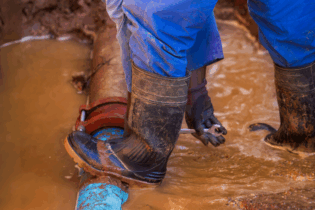Equipment offering
“Our suite of services includes design, projects, equipment, as well as operations and maintenance (O&M). We have largely been dominant in the design and projects space, as well as in providing equipment. We have done O&M very well and are now focusing on growing in that particular space. “When it comes to equipment, we see this as an exciting area of innovation. We, as a company, are able to contribute to providing affordable, resource-efficient products that respond to the demands of current conditions. For example, our retrofitting options to improve WWTW capacities and water storage solutions can be supplied in less time of comparable products and predominantly below the cost of comparative traditional solutions, which is particularly useful in times requiring rapid deployment of infrastructure in the water and wastewater industry,” says Lerutla. Fixed-film media Over the years, there has been increased development in the use of fixed-film media in the treatment of organic wastewater effluents. The benefits of a reduced footprint and improved efficiency to cope with high-strength wastes are some of the advantages that this technology has brought to the market. “Some of these earlier systems had drawbacks in that it was difficult to retrofit existing plants. The systems also used low-efficiency aeration devices and required equipment to prevent media loss or migration,” says Sevitz. “Our proprietary Cleartec IFAS (Integrated Film Activated Sludge) system overcomes these past inefficiencies,” he adds. Sevitz explains that the Cleartec system consists of a high-surface-area textile curtain that serves as the carrier for the biomass. This system combines attached biological growth with suspended biological growth, providing the best of both technologies in an efficient and cost-effective manner. The discrete vertical sheets bound within a frame ensure that the air distribution has a uniform flux across the biofilm, preventing dead spots or biomass decay. The increase in the biomass of the system reduces the footprint of the plant, thereby reducing land requirements, and also allows for the upgrade of existing works in already constructed biological reactors. Alula is an agent for the Cleartec IFAS system which utilizes the Aerostrip diffuser – a high-efficiency, fine-bubble-diffused air system which Alula is also Agents for. The diffuser is directly integrated with the textile frame – which allows the entire module to be installed as a single unit, saving both time and money. Conclusion In terms of its capabilities, track record and empowerment credentials, Alula Water has positioned itself as a force to be reckoned with. These strengths, combined with outstanding service and a dedicated focus on equipment innovation, will be what sets this company apart as the South African water sector evolves to overcome challenges relating to resource and capability scarcities, as well as economic pressures. Picture caption: Alula’s CLEARTEC system
The recently gazetted BEE Codes of Good Practice have challenged engineering firms, and other sectors of the economy, to transform and diversify. Alula Water took up the challenge, becoming a black-owned, and black women-empowered company, with a Level 2 BBBEE contributor status, while simultaneously proving its mettle as a major water sector heavyweight in South Africa.
By seizing the opportunity to drive transformation and effect broader socio-economic development – especially at board and management levels – Alula Water has positioned itself as a front runner for major government and municipal projects.
“While there are many that say they are black-owned or black-women-owned companies, we bring to the market a 25-year history, along with the accompanying knowledge and experience”, says Dinao Lerutla, Director: Operations and Strategy, Alula Water.
“If you look at the new BBBEE scorecard, there is a tremendous emphasis on the element of procurement. So, it’s not just about our compliance – it’s also about those purchasing from black entities that enable the company to maintain or improve their BEE rating. As a black-owned business, we are well positioned, from a capability and transformation point of view, to partner on water and wastewater projects, while enabling our partners to earn the highly sought after preferential procurement points,” comments Dave Sevitz Managing Director, Alula Water.
Formerly Ovivo Aqua SA, Alula Water rebranded as of April this year, in a move that Sevitz explains is not merely a name change but reflects the company’s new structural changes, enabling it to respond dynamically to shifting industrial, political and commercial norms. “So, we are not a new company; we are a new-owner company, maintaining our skills and experience while repositioning ourselves to be more responsive to the market’s needs.
“I think it was synchronous in that the business was acquired at a time when the BEE codes were being revised and the previous shareholder was considering repositioning their presence in the South African and African markets,” explains Lerutla.
Rebranding
“Alula” may sound like a phrase coming from a black African language, but it’s actually originally Latin, referring to a projection on the anterior edge of a bird’s wing.
“We chose the name because the alula is what enables birds in flight to respond to change, effortlessly, while retaining stability and reliability in flight,” explains Lerutla.
“That is how we see ourselves in the changing conditions of the local market,” Sevitz adds.
Service offering
Alula anticipates receiving the handover notification for its Medupi Boiler Water Treatment Plant (awarded as Ovivo Aqua) a project exceeding R1 billion. Alula received this order initially as a grade 8ME and successfully executed this complex project.
Some of Alula’s projects generating buzz in the local market place are its WWTWs, for Concentrated Solar Power plants.
“Alula recently received an order for another Water Treatment Plant for a Solar Power Station CSP project. As the fourth project of this kind for Alula in the past four years, we now regard ourselves as the local expert in water and deminiralised water within the renewable energy industry,” says Sevitz.






